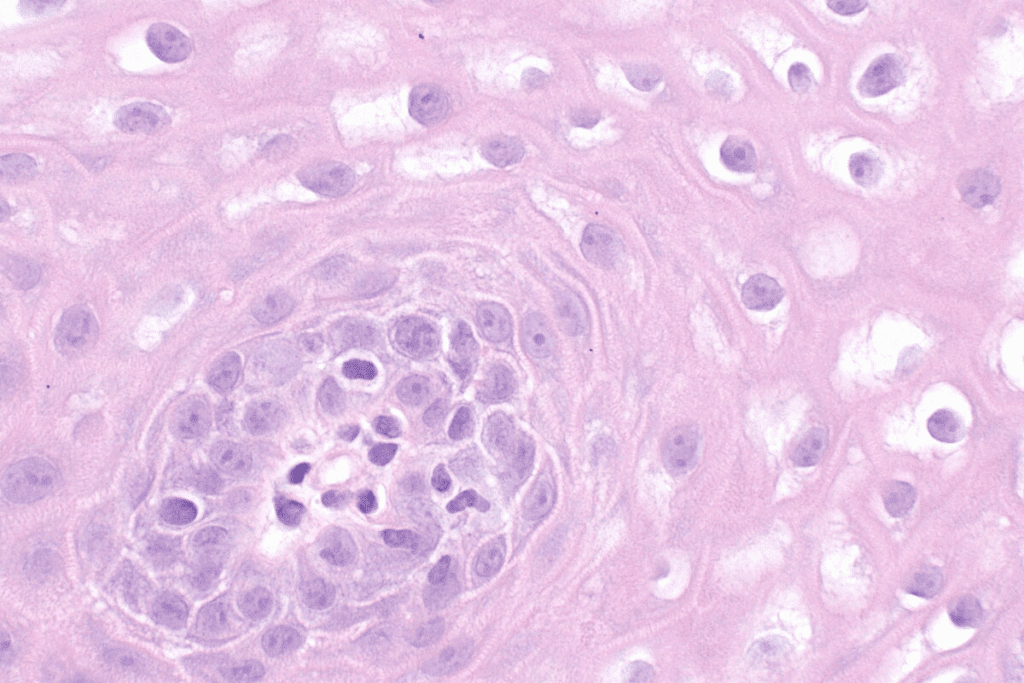
## Understanding the Connection Between GERD and Dysphagia
GERD and dysphagia are two related conditions. They can greatly affect a person’s life. Knowing the causes, symptoms, and treatments can help manage these issues.GERD dysphagia: Can acid reflux cause difficulty swallowing? Understand the mechanism of esophageal damage and spasm.
What is GERD? Understanding the Basics
Gastroesophageal reflux disease, or GERD, is a long-term condition. It happens when stomach acid flows back into the esophagus. This can cause heartburn and discomfort.
Dysphagia, or trouble swallowing, is often linked to GERD. It can really affect a person’s daily life.
Causes and Symptoms
When stomach acid flows back into the esophagus, it can irritate the lining. This leads to pain and discomfort. Symptoms include chest pain, trouble swallowing, and bringing up food.
Managing GERD and Dysphagia

Changing your lifestyle can help manage GERD and dysphagia. This includes making dietary changes and avoiding things that trigger symptoms. Doctors might also prescribe antacids or acid reducers to help.
Dysphagia Explained: More Than Just Difficulty Swallowing
Dysphagia, or difficulty swallowing, can really change someone’s life. It’s often linked to Gastroesophageal Reflux Disease (GERD).
Types of Dysphagia
There are two main types: oropharyngeal and esophageal dysphagia. Oropharyngeal dysphagia makes it hard to start swallowing, often because of nerve or muscle problems. Esophageal dysphagia is when food has trouble going down the esophagus.
Knowing the cause is key to managing it. This might mean changing your lifestyle or taking medicine to help symptoms. It’s all about improving your life quality.
The GERD-Dysphagia Connection: Statistical Evidence
Research has found a clear link between GERD and dysphagia. About 31.6% of those with GERD also have dysphagia. This shows the importance of treating both conditions together.
It’s key to understand how GERD and dysphagia are connected. Knowing this helps doctors create better treatment plans. They can focus on helping patients with both issues, leading to better results.
Understanding GERD Dysphagia: Mechanisms and Causes
GERD-related dysphagia is a complex condition. It involves many factors. The main causes are upper esophageal sphincter dysfunction and esophageal dysmotility.
| Mechanism | Description |
| Upper Esophageal Sphincter Dysfunction | Impaired UES function can lead to difficulty swallowing. |
| Esophageal Dysmotility | Abnormal contractions or spasms of the esophagus can impede food progression. |
Understanding these mechanisms is key to creating effective treatment plans.
Non-Obstructive GERD Dysphagia: The Most Common Form

Dysphagia, or trouble swallowing, is common in people with GERD. It’s often not because of a blockage. This type, called non-obstructive dysphagia, is more common in younger people. We’ll look at what makes it common in this age group.
Characteristics of Non-Obstructive Dysphagia
Non-obstructive dysphagia makes swallowing hard without a blockage in the esophagus. People with it might feel like food is stuck or moving slowly. This can be very upsetting and affect daily life a lot. Finding and treating it can be tricky because there’s no blockage to see.
Why It’s More Common in Younger Patients
Studies show non-obstructive dysphagia is more common in young people with GERD. It might be because of how their esophagus moves and feels. Younger people also tend to have stronger acid reflux, which can lead to this problem. Knowing this helps us manage and treat it better.
Non-obstructive GERD dysphagia is a big challenge. By understanding it and why it’s common in the young, we can improve how we diagnose and treat it. This helps patients get better results.
Obstructive Causes of GERD-Related Swallowing Problems
GERD can cause the esophagus to narrow, a condition known as esophageal strictures. This narrowing makes it hard to swallow and can lead to food coming back up.
Causes and Risk Factors
The main reason for esophageal strictures is long-term exposure to stomach acid. Other factors include conditions that cause long-term inflammation in the esophagus.
Symptoms and Diagnosis
People with this condition often have trouble swallowing and may regurgitate food. Doctors use endoscopy, barium swallow studies, and sometimes manometry to diagnose it.
Treatment Options
To treat it, doctors use dilation to make the narrowed area wider. Sometimes, surgery is needed to fix the underlying problem or complications.
Recognizing Dysphagia Symptoms in GERD Patients
It’s important to know the signs of dysphagia if you have GERD. Symptoms like trouble swallowing, food coming back up, and chest pain are common. If you notice any of these, get medical help right away.
Diagnosing GERD-Related Dysphagia
To diagnose GERD-related dysphagia, doctors use a detailed approach. They start with a thorough medical history and physical exam. Then, they perform tests like endoscopy and impedance testing.
These steps help doctors tell GERD-related dysphagia apart from other swallowing issues. This way, they can create a treatment plan that works. It aims to ease symptoms and enhance the patient’s quality of life.
Treatment Approaches for GERD Dysphagia
GERD dysphagia makes it hard to swallow because of gastroesophageal reflux disease (GERD). To manage it, you need to make lifestyle changes, take medications, and sometimes try other treatments.
Lifestyle Modifications
Changing your lifestyle is key to handling GERD dysphagia. Stay away from foods that trigger symptoms. Keep a healthy weight and sleep with your head raised. This helps prevent stomach acid from moving up into your esophagus.
Medication Options
There are many medicines for GERD dysphagia. You can take antacids, histamine-2 blockers, or proton pump inhibitors. The right medicine depends on how bad your symptoms are and any other health issues you might have.
With a good treatment plan that includes lifestyle changes and the right medicine, you can manage GERD dysphagia. This will help you live a better life.
Managing Dysphagia at Home: Practical Tips
## Managing Dysphagia at Home
Managing dysphagia at home needs a few key steps. You’ll need to make dietary changes, learn new eating habits, and make lifestyle adjustments. These steps can greatly improve your life quality.
### Dietary Adjustments
Start by changing your diet to include softer foods. Avoid very hot or cold foods. Choose foods that are less likely to cause choking.
### Eating Techniques
Using the right eating techniques is also important. Eat slowly, take small bites, and chew well before swallowing. Sit upright while eating and try to avoid distractions.
By following these tips and advice from healthcare professionals, you can manage dysphagia better. This will improve your health and well-being.
Preventing GERD-Related Swallowing Difficulties
To prevent GERD-related swallowing problems, we need to make lifestyle and diet changes. Keeping a healthy weight, avoiding certain foods, and raising the bed head can help. These steps can ease symptoms.
Long-term management strategies include:
- Maintaining a healthy weight to reduce pressure on the stomach.
- Avoiding trigger foods that can worsen GERD symptoms.
- Elevating the head of the bed to prevent stomach acid from flowing up into the esophagus.
By following these steps, people can lower their risk of GERD complications. This improves their overall quality of life.
Conclusion: Taking Control of GERD and Dysphagia
It’s important to understand how GERD and dysphagia are connected. Knowing the symptoms and causes helps us create a good treatment plan. This plan can help reduce discomfort and prevent serious problems.
Handling GERD dysphagia means making lifestyle changes, using medicine, and sometimes surgery. Working with doctors helps people control their symptoms. This way, they can live better lives.
By managing GERD and dysphagia well, we can avoid serious issues later. Taking action early helps improve our health and daily life. It makes living with these conditions easier.
FAQ
Is dysphagia a common symptom of GERD?
Yes, dysphagia is a common symptom of GERD. It affects many patients with this condition.
Can GERD cause difficulty swallowing?
Yes, GERD can cause difficulty swallowing. This is due to esophageal strictures, dysmotility, and acid hypersensitivity.
What is the connection between acid reflux and dysphagia?
Acid reflux from GERD can cause dysphagia. This is because of chronic inflammation, scarring, and narrowing of the esophagus.
How does GERD lead to swallowing problems?
GERD can cause swallowing problems in several ways. This includes upper esophageal sphincter dysfunction, esophageal dysmotility, and strictures or narrowing.
Are there different types of dysphagia associated with GERD?
Yes, there are different types of dysphagia with GERD. These include obstructive and non-obstructive dysphagia, each with unique causes and characteristics.
Can lifestyle modifications help manage GERD-related dysphagia?
Yes, lifestyle changes can help manage GERD-related dysphagia. This includes dietary adjustments, eating techniques, and swallowing exercises.
What are the treatment options for GERD dysphagia?
Treatment options for GERD dysphagia include lifestyle changes and medication. In some cases, surgery may be needed to address underlying causes.
How is GERD-related dysphagia diagnosed?
Diagnosing GERD-related dysphagia involves a detailed medical history and physical exam. Tests like endoscopy, barium swallow, or esophageal manometry are also used.
Can GERD-related dysphagia be prevented?
While not fully preventable, GERD dysphagia can be managed. This is through long-term GERD management, lifestyle changes, and regular medical check-ups.
What are the early warning signs of dysphagia in GERD patients?
Early signs of dysphagia in GERD patients include trouble swallowing certain foods. Feeling like food is stuck and pain or discomfort while swallowing are also signs.
When should I seek medical attention for dysphagia?
Seek medical attention for persistent or severe dysphagia. It could be a sign of a serious complication or condition that needs medical evaluation.
Refrence
National Center for Biotechnology Information. (2025). Can GERD Cause Dysphagia Understanding Swallowing Issues. Retrieved from https://www.ncbi.nlm.nih.gov/pmc/articles/PMC8384755/



































